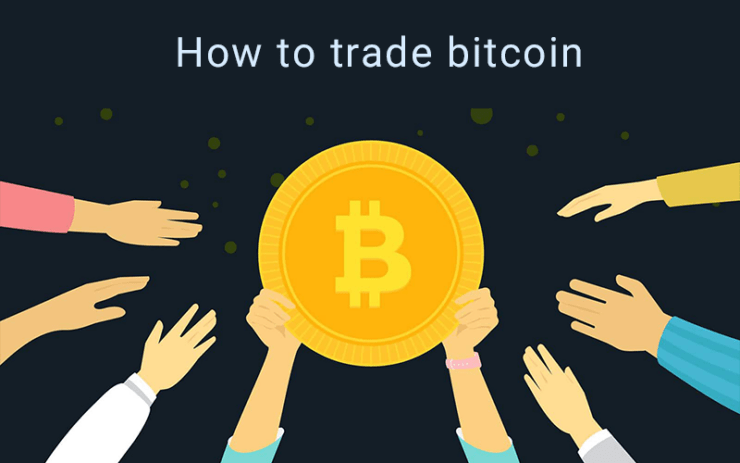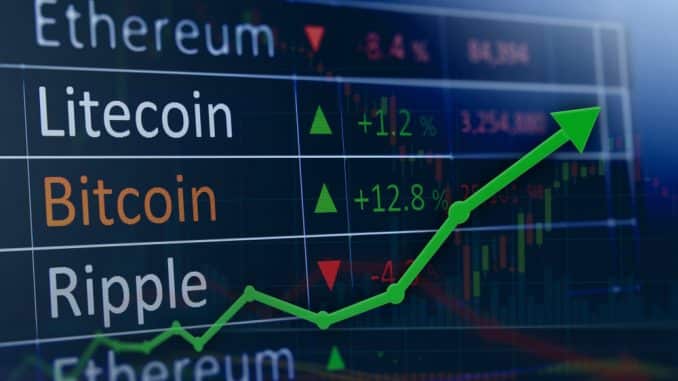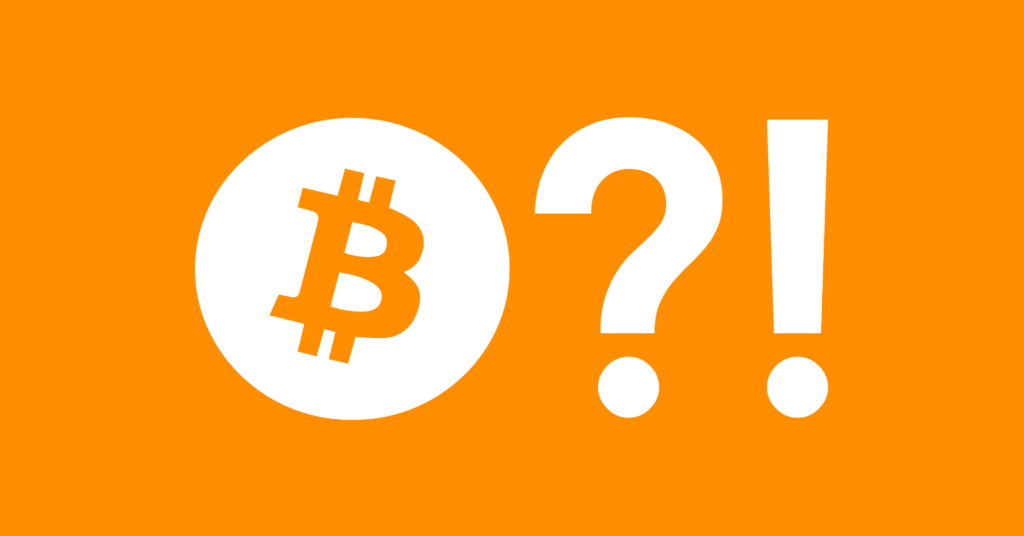Don’t invest unless you’re prepared to lose all the money you invest. This is a high-risk investment and you are unlikely to be protected if something goes wrong. Take 2 minutes to learn more
In a time not so long ago, Bitcoin – the world’s first and still de-facto cryptocurrency, was nothing more than a developer’s pipedream. Fast forward to 2023 and the digital currency is now a multi-billion pound asset class. That’s why we decided to discuss Bitcoin trading.
Our Crypto Signals
1-month subscription
 Up to 5 signals daily
Up to 5 signals daily 76% success rate
76% success rate Entry, take profit & stop loss
Entry, take profit & stop loss Amount to risk per trade
Amount to risk per trade Risk reward ratio
Risk reward ratiomonth
3-month subscription
 Up to 5 signals daily
Up to 5 signals daily 76% success rate
76% success rate Entry, take profit & stop loss
Entry, take profit & stop loss Amount to risk per trade
Amount to risk per trade Risk reward ratio
Risk reward ratiomonth
 Most popular
Most popular
6-month subscription
 Up to 5 signals daily
Up to 5 signals daily 76% success rate
76% success rate Entry, take profit & stop loss
Entry, take profit & stop loss Amount to risk per trade
Amount to risk per trade Risk reward ratio
Risk reward ratiomonth
12-month subscription
 Up to 5 signals daily
Up to 5 signals daily 76% success rate
76% success rate Entry, take profit & stop loss
Entry, take profit & stop loss Amount to risk per trade
Amount to risk per trade Risk reward ratio
Risk reward ratiomonth
Lifetime Subscription
 Up to 5 signals daily
Up to 5 signals daily 76% success rate
76% success rate Entry, take profit & stop loss
Entry, take profit & stop loss Amount to risk per trade
Amount to risk per trade Risk reward ratio
Risk reward ratioNot only can you buy, sell and, trade Bitcoin on third-party cryptocurrency exchanges, but the asset class now has a fully-fledged, regulated futures market.
8cap - Buy and Invest in Assets

- Minimum deposit of just 250 USD to get lifetime access to all the VIP channels
- Buy over 2,400 stocks at 0% commission
- Trade thousands of CFDs
- Deposit funds with a debit/credit card, Paypal, or bank transfer
- Perfect for newbie traders and heavily regulated

Take note, while Bitcoin trading is becoming more and more popular in the online space, it’s still a highly speculative and volatile asset. In fact, it’s not uncommon for the cryptocurrency to go up or down in value by more than 10% in a single day.
Nevertheless, if you’re looking to find out how you can get your cryptocurrency investment career off on the right foot – be sure to read our in-depth Bitcoin Trading Guide. Within it, we cover the ins and outs of how Bitcoin trading works, what risks you need to consider, how you make money, which platforms you should trade at, what are some Bitcoin price predictions and more.
Note: If you’re looking to trade Bitcoin on a short-term basis and thus – you want the option of buying and selling at the click of a button, you might be best to trade CFDs.
What are the Pros and Cons of Bitcoin Trading?
The Pros
The Cons
What is Bitcoin?
Before we delve into the specifics of trading the digital currency, let’s make sure that we understand what Bitcoin actually is. In its most basic form, Bitcoin is a cryptocurrency that was created by an anonymous developer in 2008. The underlying technology is called the ‘blockchain’, and it allows the Bitcoin system to operate in a ‘decentralized’ manner.
In layman’s terms, this means that no single persona or authority controls the Bitcoin network, nor is the currency itself backed by any government or central bank. On the contrary, transactions are validated and confirmed by ‘miners’. Anyone can become a Bitcoin miner as long as they have the required hardware device.
In return for contributing surplus electricity, successful miners are rewarded with Bitcoin. Bitcoin as a currency is virtual, meaning that it does not exist in a physical form like the Pound or US dollar. Instead, all transactions and account balances are stored on the blockchain – which is not only immutable to the threats of malpractice, but it facilitates anonymous, fast, and cheap transfers.
With that being said, the main use-case for between up to this point has been for speculative means. This is why it is now a multi-billion pound asset class that can be traded by both retail and institutional clients.
What is Bitcoin Trading?
If an asset has value, it’s likely that a tradable marketplace is in existence. Whether that’s oil, gold, wheat, sugar, or grain – most commodities that derive value can be bought and sold by investors – with the primary aim of making money. This concept is no different in the case of Bitcoin and other cryptocurrencies.
As such, you can now trade Bitcoin in the same way that you would trade any other asset class. With that said, Bitcoin trading is also somewhat similar to forex trading, insofar that you will be trading Bitcoin against another currency. This can be a fiat currency like GBP, USD, or EUR, or against an alternative digital currency like Ethereum and Ripple.
Note: Although Bitcoin has the currency code ‘BTC’, some platforms use ‘XBT’ instead.
However, the largest and most liquid Bitcoin pairing is that of the US dollar. In fact, at the time of writing this guide – the BTC/USD market has facilitated more than $23 billion worth of trades in just 24 hours. As such, whether you’re looking to trade a few pounds or six-figures – there’s more than enough liquidity to go around.
Let’s say a look at how a Bitcoin trade might work in practice.
- You decide to trade Bitcoin against the US dollar, as this is the largest marketplace in the space.
- Bitcoin is currently priced at $10,000 – although you feel it is like to increase in price in the short-term.
- As such, you place a ‘buy order’ on the BTC/USD pair at $500
- Over the course of the next 48 hours, Bitcoin increases to $12,000 – representing 20% in gains.
- As you invested $500, your 20% gains have netted you a profit of $100.
Note: Although the BTC/USD is denominated in the US dollar, your UK-based broker can still convert profits and losses into Pound Sterling.
How to Trade Bitcoin?
In order to buy, sell, and trade Bitcoin – you will need to use a third-party platform. Depending on the type of asset structure you wish to invest in, this could be a specialist cryptocurrency exchange or a regulated CFD broker. Crucially, this will depend on whether you plan to trade Bitcoin on a short-term/day trading basis or hold on to your investment long-term.

As such, below we’ve broken down the main avenues that allow you to engage in Bitcoin Trading.
Trading Bitcoin Through 100% Ownership
If you’re looking to trade Bitcoin in its truest form, then you will first need to purchase the digital currency. Although we’ll explain how this works in more detail further down, you will need to use a third-party cryptocurrency exchange that is licensed to accept fiat currency deposits.
This will then allow you to use a debit/credit card or bank transfer to buy Bitcoin, which you can then trade with other currencies. Once you’re in possession of Bitcoin, you have two options. If you’re looking to engage in day trading, then you can trade it against other cryptocurrencies such as Ethereum.
Note: If you’re looking to own Bitcoin 100% and then trade it with fiat currencies like the US dollar, you will likely need to do this via BTC/USDT pair. USDT is a cryptocurrency known as Tether that is pegged to the US dollar.
Similarly, if you want to trade your Bitcoin against the US dollar, you can do this at your chosen cryptocurrency exchange. The second option is to withdraw your Bitcoin to your private wallet for safekeeping. This option is for those that wish to invest in Bitcoin in the long-run, with the hope that in the future it will be worth significantly more.
Trading Bitcoin CFDs
If you’re a seasoned investor that’s looking to access the Bitcoin space on a day trading basis, we would strongly suggest considering CFDs (contract-for-difference). CFDs allow you to speculate on the future price of an asset without needing to own or store it. Not only are CFDs available in the Bitcoin arena, but virtually every tradable asset class in existence.
Whether it’s stocks and shares, gold, oil, natural gas, or the S&P 500 – CFDs allow you to trade assets at the click of a button. The benefits of trading Bitcoin via a CFD broker are plentiful. First and foremost, unlike third-party cryptocurrency exchanges, the CFD brokerage industry is a heavily regulated battleground.

For example, in the UK all CFD brokers must hold a license with the Financial Conduct Authority. This affords you a range of regulatory safeguards that would not otherwise be available at a cryptocurrency exchange. Secondly, CFD platforms support everyday payment methods like a debit/credit card, bank transfer, and even e-wallets like PayPal.
As such, there is no need to actually purchase Bitcoin to start trading it. Instead, you simply need to open an account, deposit funds, and then purchase a Bitcoin CFD instantly. This is also beneficial when it comes to closing your trade. You won’t need to worry about transferring your Bitcoin profits to a digital wallet. Instead, UK CFD platforms will denominate balances, profits, and losses in GBP.
Trading Bitcoin Derivatives
As the cryptocurrency investment scene has become more and more wide-spread, exchanges and brokers are now offering more sophisticated financial instruments. This includes a futures market on both the CME and CBOE – which are two of the largest derivatives exchanges in the world. With that being said, while the CME and CBOE are catered to institutional investors, you can also access Bitcoin futures markets as a retail investor.
Here’s an example of how a Bitcoin futures trade might pan out.
Example of a Bitcoin Futures Trade
Let’s say that you are bullish on the future direction of Bitcoin. As such, you decide to invest in a Bitcoin futures contract. The contract has a three-month expiry date, meaning that you will be forced to sell the contract either on, or before, the maturity date. The price of the Bitcoin contract is $8,000.
- You buy 2 Bitcoin futures contracts at $8,000 each.
- Although this amounts to a trade size of $16,000, you will only be required to put up a small margin.
- You decide to let the contract run to maturity, as the price of Bitcoin is rallying.
- When the contract expires in three months, the price of Bitcoin is $10,000.
- This means that each contract is worth $2,000 more than the price in which you paid.
- You own 2 futures contracts, meaning that your net profit is $4,000.
Similarly, put and call options have also reached the Bitcoin investment scene. This allows you to pay a ‘premium’ – which then gives you the option, but not the obligation, to purchase Bitcoin at a later date.
Here’s an example of how a Bitcoin options trade might pan out.
Example of a Bitcoin Options Trade
Although not as wide-spread as futures, Bitcoin options are available on a number of trading platforms. The main concept is that you pay a premium on Bitcoin to access the options market. For example, let’s say that Bitcoin is valued at $10,000, and the strike price is $11,000. The premium on a call option is 10 cents on the dollar.
- You want to risk $300 buying a Bitcoin call option.
- This gives you access to $3,000 worth of Bitcoin. Only one of two things can happen.
- If Bitcoin does not hit the strike price of $11,000 before the contract expires, you will lose your $300 premium.
- The second scenario – which is what you would be hoping for, is Bitcoin surpasses the strike price of $11,000.
- Let’s say that two weeks later, Bitcoin is sitting at $12,000.
- You’ve surpassed the strike price, so you decide to offload your investment at a profit.
- The premium that you previously paid now gives you the right to purchase Bitcoin, albeit, you’ll pay $11,000, as opposed to the current market value of $12,000.
Bitcoin Trading Fees
As is the case with any asset class that you wish to trade online, you need to make some considerations regarding fees. This can come in a number of different forms, so be sure to read through the following points.
🥇 Percentage Fee
The most common fee that you’ll encounter when trading Bitcoin online is that of a percentage fee. The fee is calculated against the size of your order, and you’ll need to pay it twice. You’ll pay it when you first open the trade, as well as when you close it.
For example, let’s say that the trading fee amounts to 1%. If you were to buy £250 worth of Bitcoin, you would initially pay £2.50 in fees. If the value of investment grew to £400, and you decided to close the trade to realize your profits, you would then pay £4 in fees.
🥇 Flat Fee
Some Bitcoin trading platforms will charge you a flat fee every time you place a trade. For example, let’s say that the broker charges £4.50 per trade. Regardless of the size of your order, you will pay £4.50 when you buy Bitcoin, and £4.50 again when you sell it. The flat fee system is more beneficial to those that trade really large amounts.
🥇 Commission-Free Platforms
Some online trading platforms now allow you to buy and sell Bitcoin on a commission-free basis. This means that you won’t pay a trading fee at either end of your trade, which is great. However, newbie traders often forget about the spread, as this is a fee that you’ll pay indirectly.
🥇 The Spread
Regardless of what you are trading, there will always be a spread. This is the difference between the ‘buy’ price of an asset and the ‘sell’ price. You can calculate the spread in percentage terms, which then gives you a clear indication as to how much you are paying in fees.
For example, let’s say that the difference in the buy and sell price of Bitcoin amounted to 1.5%. If you then proceeded to go long on Bitcoin, you would need the price to increase by at least 1.5% just to break even.
As such, if you ever wondered why you’re always in the red as soon as a trade is executed, this is because of the spread!
🥇 Financing Fees
If you plan to trade Bitcoin on leverage, then you will also need to assess what financing fees the platform charges. This operates in a similar nature to a loan, not least because you are borrowing the leveraged funds from the broker.
Financing fees will vary depending on the type of asset that you are trading, although in the case of Bitcoin, it’s likely to be expensive.
Moreover, financing charges are based on a percentage of the amount you borrow. For example, the broker might charge 6% over the course of the year, and you’ll pay the pro-rata rate for each day that you keep the leveraged trade open.
Can I Trade Bitcoin on Leverage?
A number of Bitcoin trading platforms now allow you to trade on leverage. The amount of leverage that you will be able to get will depend on a range of factors. Firstly, if you decide to use a regulated CFD platform to trade Bitcoin, then the broker will need to comply with the regulations set out by the European Securities and Markets Authority (ESMA).
This stipulates that retail investors are capped to leverage levels of just 2:1 when trading Bitcoin and other cryptocurrencies. However, if you have a firm understanding of the risks, and you’re looking to apply much higher levels of leverage, you can use a crypto-derivative platform.
Note: As tempting as leverage can be, you could lose a lot of money if your trade goes against you. In fact, you’ll lose your entire stake if your trade is liquidated, so tread with extreme caution.
Such platforms deal exclusively in cryptocurrency deposits and withdrawals, meaning that they are not required to comply with the same regulations as fiat-based brokers. As such, you can trade Bitcoin with leverage of up to 100:1.
How to Choose a Crypto Trading Platform?
If you have read our guide up to this point, it is hoped that you now have a firm grasp of what Bitcoin trading is. If you’re now at the stage where you want to get your Bitcoin trading career started, you will need to choose a platform.
With hundreds of exchanges and brokers now active in the market, knowing which platform to go with is no easy feat. As such, we would suggest exploring the following criteria prior to opening a new account.
🥇 Regulated CFD Broker or Cryptocurrency Exchange?
First and foremost, you need to decide whether you want to benefit from the convenience of Bitcoin CFDs, or if you want to actually own Bitcoin and trade it with other currencies. If opting for CFDs, you’ll be using a regulated CFD broker that is licensed by the Financial Conduct Authority (FCA)
On the contrary, very few cryptocurrency exchanges hold regulatory licenses, especially in the UK. Nevertheless, this is the risk that you will need to take if you want to trade Bitcoin in its truest form.
🥇 Payments
You also need to think about funding. For example, how do you intend on depositing funds into your trading account? If you want to use an everyday credit/debit card, bank transfer, or -e-wallet, your best option is going to be a CFD broker. This is regulated brokers have the legal remit to support fiat currency.
Alternatively, some crypto exchanges allow you to deposit funds with a bank account. The fees are usually minimal, although you will need to wait a couple of days for the funds to clear.
🥇 Fees
You will always pay trading fees when buying and selling Bitcoin online – even if opting for a commission-free broker. With that said, you should choose a platform that offers a pricing structure to suit your requirements. For example, if you find yourself trading really large volumes, you might be best to use a broker that charges flat-fee commissions.
On the other hand, if you are a newbie trader that wishes to invest small amounts, you’ll likely be better suited for a variable percentage fee. Either way, don’t forget about the spread!
🥇 Number of Bitcoin Pairs
As you’ll be trading Bitcoin against another currency, you need to explore how many trading pairs the broker in question offers. For example, are you looking to trade Bitcoin against other fiat currencies like the USD and GBP?
Alternatively, were you planning to trade Bitcoin against other digital currencies like Ethereum? Crucially, explore the trading arena prior to signing up.
🥇 Trading Tools
Successful traders will always utilize technical analysis tools. Although at first glance they might appear confusing, it’s important that you understand how the likes of Exponential Averages and Fibonacci Retracement tools work.
Such tools allow you to analyze historical pricing trends in an in-depth manner, so we prefer trading platforms that offer heaps of charting indicators.
🥇 Research
It is also handy if the Bitcoin trading platform offers up-to-date research tools. At a minimum, this should include relevant news events that could have a direct impact on the price of Bitcoin. That’s why taking a look at multiple Bitcoin price predictions is crucial.
For example, when the Securities and Exchange Commission (SEC) rejected a prominent Bitcoin ETF application last year, the markets instantly responded by performing a major sell-off. As such, you’ll want a trading platform that gives you real-time access to important events.
Best Bitcoin Trading Sites and Platforms of 2023
Not too sure which Bitcoin trading platform to go with? While we would still suggest performing your own due diligence on a platform prior to signing up, below we have listed our top three picks of 2023.
1. AVATrade – 2 x $200 Forex Welcome Bonuses
The team at AVATrade are now offering a huge 20% forex bonus of up to $10,000. This means that you will need to deposit $50,000 to get the maximum bonus allocation. Take note, you'll need to deposit a minimum of $100 to get the bonus. And your account needs to be verified before the funds are credited. In terms of withdrawing the bonus out, you'll get $1 for every 0.1 lot that you trade.

- 20% welcome bonus of upto $10,000
- Minimum deposit $100
- Verify your account before the bonus is credited
2. EuropeFX – Great Fees and Several FX Trading Platforms
As the name suggests, EuropeFX is a specialist forex broker. With that said, the platform also supports CFDs in the form of shares, indices, cryptocurrencies, and commodities. You will be able to trade via MT4, so you can choose from desktop software or a mobile/tablet application. If you want to trade via your standard web browser, the broker also offers its own native platform - EuroTrader 2.0. In terms of fees, EuropeFX offers super-tight spreads on major pairs. Your money is safe at all times, not least because the broker is authorized and licensed by CySEC.

- MT4 and native trading platforms
- Super-low spreads
- Great reputation and licensed by CySEC
- Premium account has a minimum deposit of 1,000 EUR
3. EightCap – Trade Over 200+ Assets Commission-Free
EightCap is an online forex broker that is fully compatible with MT4. You can trade over 200 financial instruments at this popular platform and there are two account types to choose from.
One account permits commission-free trading with spreads starting at just 1 pip. Or, you can trade from 0 pips at a flat commission of $3.50 per slide. In terms of markets, EightCap covers everything from forex and shares to indices and commodities.
Not only can you get started with this broker for just $100, but you can trade for free via the demo account facility. Most importantly, this broker is regulated by tier-one body ASIC.

- ASIC regulated broker
- Trade over 200+ assets commission-free
- Very tight spreads
- No cryptocurrency trading
8cap - Buy and Invest in Assets

- Minimum deposit of just 250 USD to get lifetime access to all the VIP channels
- Buy over 2,400 stocks at 0% commission
- Trade thousands of CFDs
- Deposit funds with a debit/credit card, Paypal, or bank transfer
- Perfect for newbie traders and heavily regulated

FAQs
What can I trade Bitcoin with?
Is Bitcoin margin trading a thing?
What is the minimum deposit required at a Bitcoin trading site?
Who regulates Bitcoin trading sites in the UK?
Can I trade Bitcoin 24/7?
What is a Bitcoin CFD?
Can I short Bitcoin??
